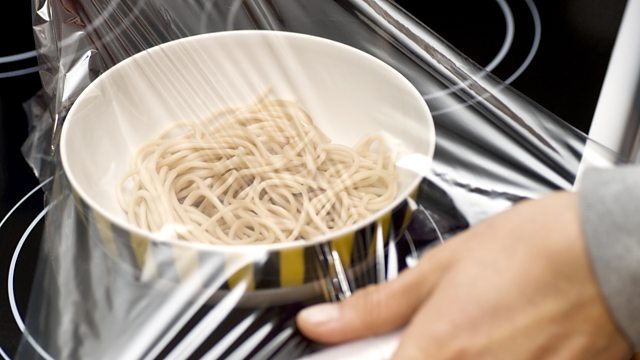Cellophane
When Jacques Brandenberger invented cellophane, consumers loved it. Clear plastic food packaging transformed the way we purchased food, as well as how producers sold it.
Plastic food packaging often seems obviously wasteful. But when Jacques Brandenberger invented cellophane, consumers loved it. It helped supermarkets go self-service, and it was so popular Cole Porter put it in a song lyric. Nowadays, people worry that plastic doesn鈥檛 get recycled enough but there are two sides to this story. Plastic packaging can protect food from being damaged in transit, and help it stay fresh for longer. Should we care more about plastic waste or food waste? As Tim Harford explains, it isn鈥檛 obvious and the issue is complicated enough that our choices at the checkout may accidentally do more harm than good.
Producer: Ben Crighton
Editor: Richard Vadon
(Image: Noodles and cellophane, Credit: Getty Images)
Last on
Sources
Are seafood lovers really eating 11,000 bits of plastic per year?
Plastic: The Making of a Synthetic Century. Stephen Fenichell. HarperBusiness, 1996.
Inventors of Food and Agriculture Technology. Heather S. Morrison. Cavendish Square Publishing, 2015.
Cellophane, the New Visuality, and the Creation of Self-Service Food Retailing. Ai Hisano. Harvard Business School Working Paper 17-106
Science and Corporate Strategy: Du Pont R and D, 1902-1980. David A. Hounshell, John Kenly Smith, Jr. Victor Smith. Cambridge University Press, 1988.
How to Make Money Selling Meat, Craig Davidson and Fred Orval Briton. Progressive Grocer, 1938.
Plastic: The Making of a Synthetic Century. Stephen Fenichell. HarperBusiness, 1996.
听 听Broadcasts
- Sat 6 Apr 2019 04:50GMT大象传媒 World Service except East and Southern Africa & South Asia
- Sat 6 Apr 2019 13:50GMT大象传媒 World Service News Internet
- Sun 7 Apr 2019 14:50GMT大象传媒 World Service except Americas and the Caribbean, East Asia & South Asia
- Sun 7 Apr 2019 21:50GMT大象传媒 World Service except East and Southern Africa & West and Central Africa
- Sun 7 Apr 2019 22:50GMT大象传媒 World Service East and Southern Africa & West and Central Africa only
- Mon 8 Apr 2019 03:50GMT大象传媒 World Service South Asia
Podcast
-
![]()
50 Things That Made the Modern Economy
The stories of inventions, ideas and innovations which helped create the economic world


